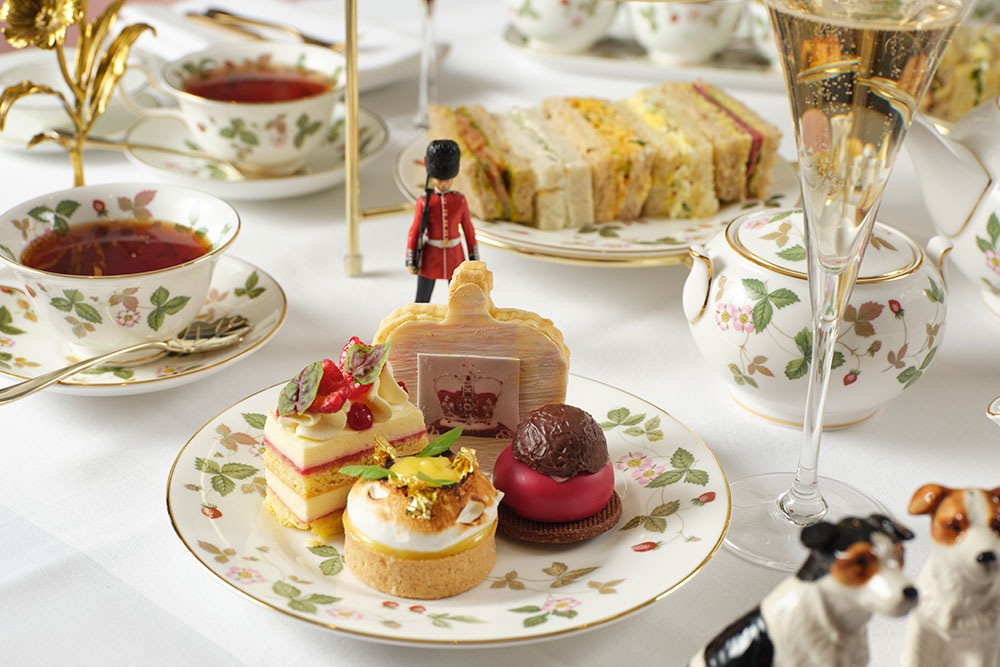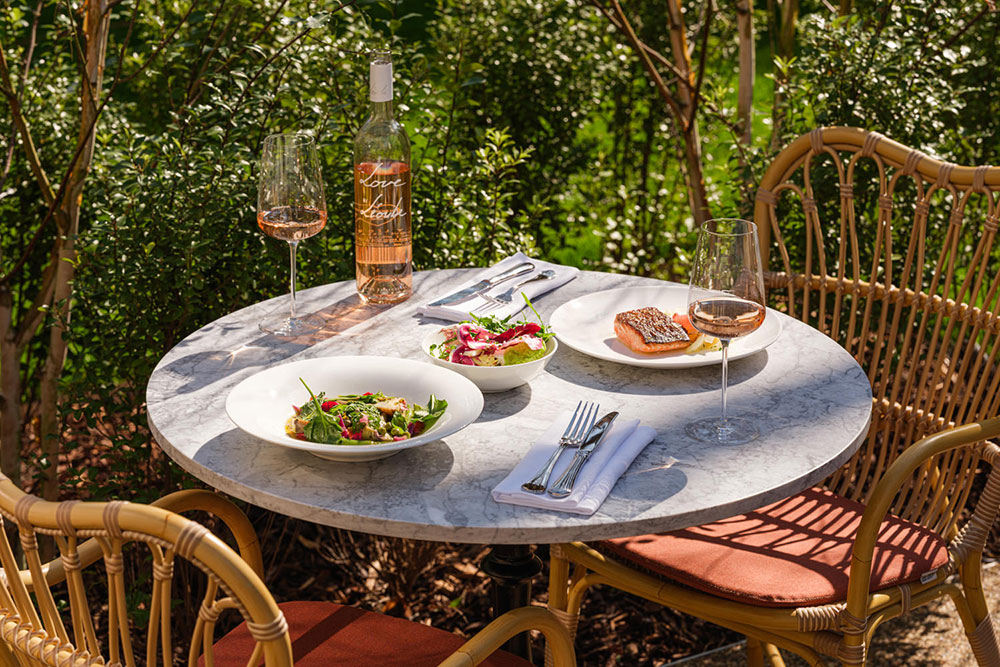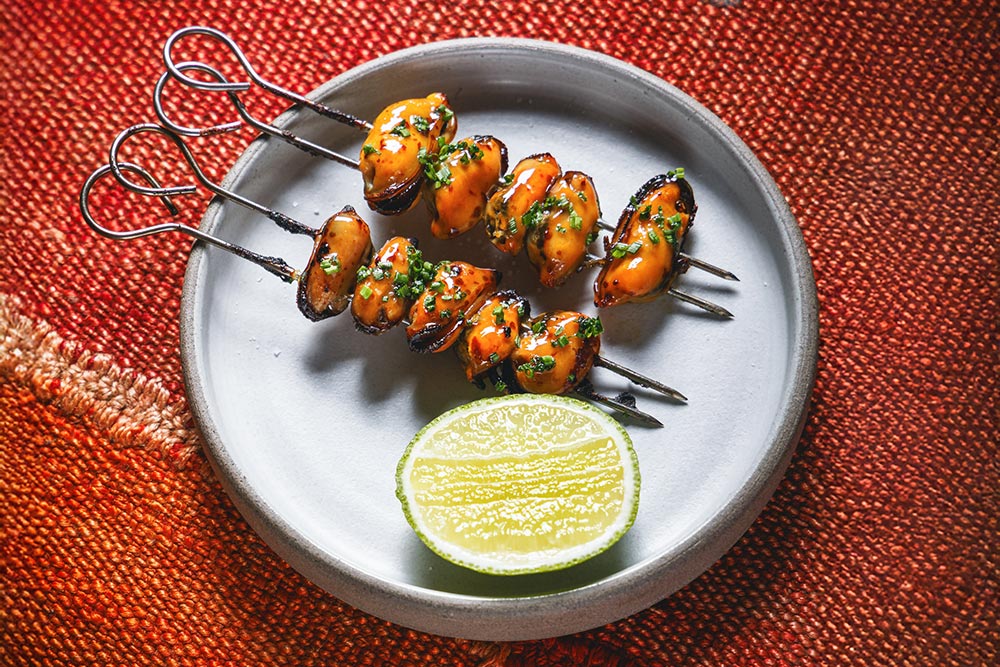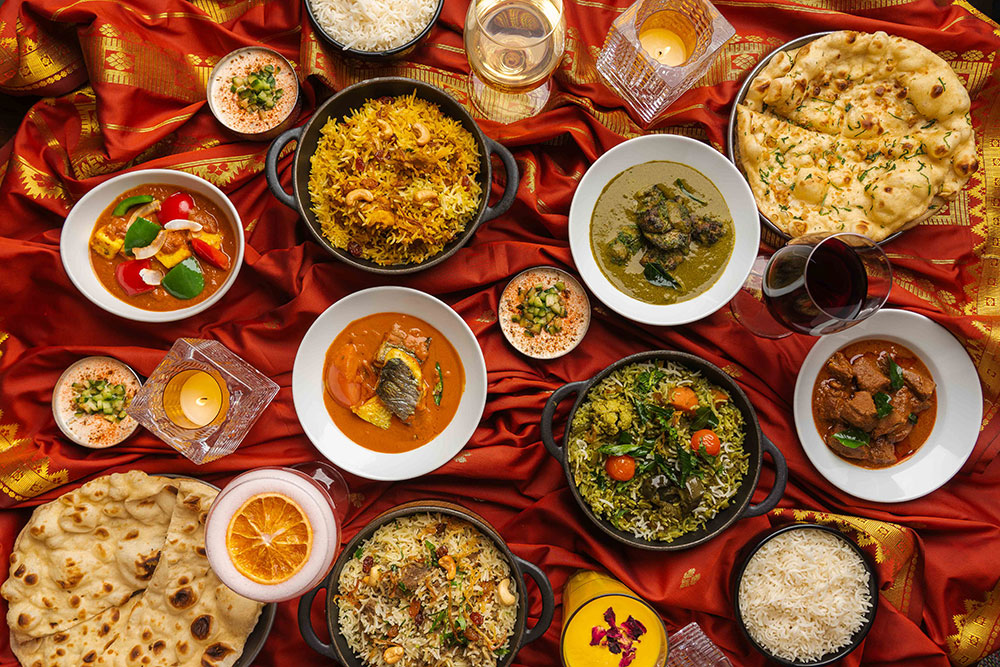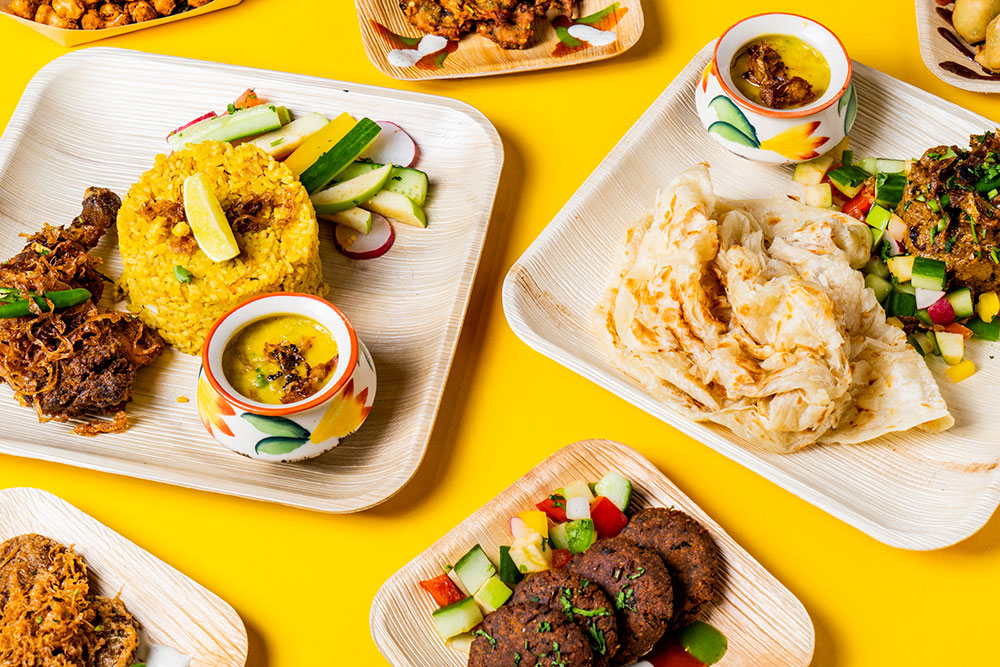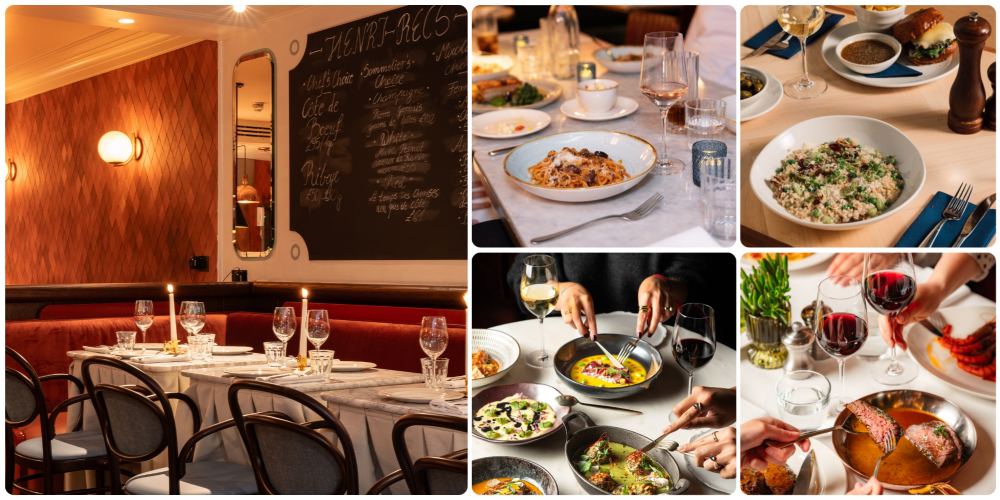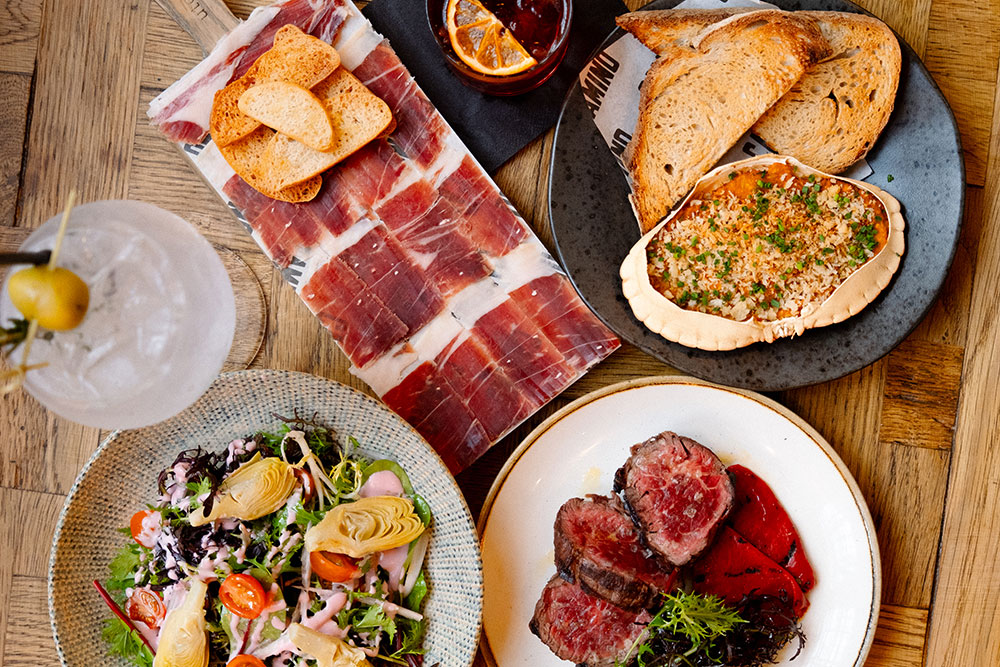Three years ago, ostensibly at the top of his game with two Michelin stars under his belt, Eric Chavot decided he wasn’t playing the game anymore. He announced his decision to leave The Capital where he’d been for a decade building up his reputation as one of London’s great chefs and go off and do his own thing.
After an extended stint cooking at the Selfridges rooftop pop-up with his mentor Pierre Koffmann and then a few years globetrotting with Selfridges owners The Westons, Eric’s now back with a vengeance. He’s opening a new restaurant in Mayfair – Brasserie Chavot at the Westbury hotel and he wanted to tell Hot Dinners all about it.
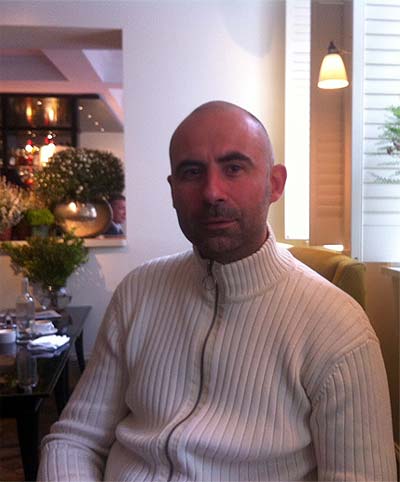 So why this restaurant and why now?
So why this restaurant and why now?
I’ve only been looking for this since I was fourteen and a half years old. Don’t laugh! To understand why now, you have to know where I came from. I’m from a small village in France and one day a gentleman took over the little cafe. He was from Brittany so he was an outsider, so everybody goes ‘Well, that’s not going to work’. But he put hard work and sweat into it and I became an apprentice in his place. Within a year I said to myself for the rest of my life this is what I want to do.
How did you end up in London?
After college I wanted to go to catering college, but my grade in English was so bad that my English teacher wanted to keep me back a year. She blocked my application for catering college. I quit, I was 14 and didn’t know what to do and I was stubborn. I took a job in a restaurant for the summer and at the end they took me on as an apprentice. That’s how I started.
Later, I came to London to learn English and prove to her. But that one year became 27 years. I went to Mr Koffmann [Pierre Koffmann at Tante Claire] and that was the start of my life – my life with Michelin and then before I know it I’m at the Capital for ten years and it’s time to go.
Why exactly did you leave the Capital?
Because we’d done everything. Ten years is a long time when you’re not the owner – I was just the chef. There were no shares, nothing. But then I knew that from the beginning. We pushed it and did everything – my team was with me for nine years and started to fidget as well. The manager had left and Monsieur Levin [The Capital’s owner] wanted to open a brasserie – and I said to myself ‘It’s time to move on’. It was scary – you’re 43 and everyone else is established, but I did it and haven’t looked back since.
What happened next?
I thought I’d take some time off. As if! I had a crazy summer of gala dinners, then I did the pop up at Selfridges with Koffmann and ten days there became two months. The good thing was that Bruno [Loubet] came back as well. It was like we were back being 18 when we first met the Chef. At the pop-up we worked 20 hours a day! At the end of it, Ewan Venters (then Food and Restaurants Director at Selfridges) said that Mr and Mrs Weston [the owners of Selfridges] want to meet you. They’ve got the Windsor Club in Florida. So we flew out and they wanted someone till the end of the season – for four months. And Ewan said; ‘You deserve it – something completely different, clear your head, put a bit of money on the side. Then you can come back and we can start looking into what you want to do.’
Within two weeks, the director came to me and said Mr and Mrs Weston need a private chef. The chef at the club there said ‘Don’t look at me!’ and it’s like there’s 100 of you in a row – everyone else took a step backwards and there was just me left.
It must have been quite a leap from running your own restaurant to being a private chef?
I loved that – very difficult. You’ve got to produce something different every day – use everything you know. You get a briefing every day – which would be great if they then followed it! The pattern is that there’s no pattern. The Westons were absolutely brilliant – they ate everything I cooked. It was an amazing house – you could eat on the beach, in the East Wing, in the West Wing, in the dining room, downstairs by the pool. Yes they’re billionaires, but it’s just a house and your job is to cook. Your only problem is as a private chef that you’re the senior chef in all of their houses, so you’ve got to be there 24/7. It’s tough on you and it wasn’t going to be forever.
So I did that for two years, the contract finished naturally this May and I was ready to move on.
You do look really pleased to be back in London.
My home is (in London). I don’t miss Florida. I came back in June and it was pissing down with rain every day and I’m on my Vespa with a stupid smile on my face. I’ve got rain again. It’s cold! There are seasons!
I come from a small village in France. When I came to London, I was like a little kid. For me, I’m on holiday every day here. My home is here. I don’t miss Florida. I came back in June and it was pissing down with rain every day and I’m on my Vespa with a stupid smile on my face. I’ve got rain again. It’s cold! There are seasons!
Did you have any idea what you wanted to do?
Well I got a call from Kirsty Stanley Hughes of KSH Management Ltd, who represents me and who said that David Yeo has a space at the Shard – they wanted a brasserie. But I’ve got vertigo and this is the 31st floor which isn’t going to be great. And all I can think of is the Hilton Towers – my sous chef Richard used to work there and to get food up to the 28th floor there is a nightmare.
So where should I start? The only thing I knew is that I wanted to open a bistro or a brasserie. Everyone goes, ‘But what about Michelin?’ Well what about it? James Bond has a licence to kill, Michelin gives us a licence to cook. I was lucky enough to work for Koffmann, Raymond [Blanc], I did Marco, I did Nico [de Ladenis] – that’s before I opened my first place. Four aspects of Michelin.
Mr Koffmann used to say; “At the end of the day, it’s just food,” - whether you do it in a posh environment or not, as long as you put your heart into it.
When you were a Michelin-starred chef, did you feel under pressure to keep those stars, particular when you rose to two?
You do in a way. You pretend not to. I didn’t think ‘Oh God, are we going to lose it’ – if we lose it, we lose it, but it took me a long time to understand that. I now know that at the end of the day, it is what it is. Every journey that will come, will come. You can’t keep on working like that. This is not good for anyone.
At The Capital, from the same little kitchen we had to do breakfast, lunch, afternoon tea, dinner, room service and private functions - when most other restaurants just have to do lunch and dinner. The pressure came from trying to get everything good and that’s what we worked on – the bread was made in house, the jam was homemade, every single chocolate in your bedroom was homemade.
But you’ve chosen once again to work in a hotel, this time the Westbury?
This is very different. We’re next door in a different building – Washington House. We’re going to make it very Chavot. We’re going to take off the pictures, put in small chairs, beautiful banquettes – going to put some work stations in to partition that room. There’s a huge six metre bar at the back which we’re going to pimp and use as my counter for seafood. There are five beautiful stools and you can come down there and I’ll give you six oysters, my little crepinettes...
What style of food will it serve?
We’ll do classic modern, but pimped. The London scene has changed so much, but in a good way. I arrived here in 1986 where there was still a few of the grand hotels – the Dorchester and the Ritz run by the big Swiss-German chefs. You had Roux, Koffmann – Marco wasn’t there in 86.
In 1987 it changed. God created woman, and the media created Marco. The gates opened. You find better food – or just as good - in London now as in Paris. You can just look at Phil at the Square, Bruce [Poole at Chez Bruce], Brett [Graham at the Ledbury] – all that company. Then you’ve got Anthony Demetre and Bruno’s back. There are a lot of things happening here now – it’s growing nicely.
And how have those changes to the London scene influenced this new brasserie menu?
You’ve got to move on with the times. We all started – Phil, Gordon, Marcus – more or less 20 years ago. We all worked for the big chefs and we all started opening things. They grew, but for some reason I have to start again. Do I really want to start, aged 45, with Michelin? To do that, it’s not a 2CV – it’s minimum Mercedes moving to Rolls Royce – you need someone who’s going to invest in all of that. I don’t feel that old, but I want to have fun and I want to take the pressure away.
How far have you got with menu planning?
We’ll do classic modern, but pimped... I’m going to undo Chavot from 20 years of Michelin
I’m going to undo Chavot from 20 years of Michelin and I’m going to present that. It’s going to come to you in a cassoulet or cocotte pot for one. So already I’ve cut half the china. For seafood we’re not going back to the platter of fruits de mers with the lobster winking at you – we’re going to do crab mayonnaise. But we’re going to use King Crab for that. Or we’ll have cured salmon – cured with beetroot, gravadlax and it’ll come out on a basket of soft-shell crab with a nice little aioli and some tzatziki on the side. We’ll have beetroot salad with pate de tete – cube it, put a blue cheese dressing on it and serve with a piece of crusty bread on the side. [At this point Hot Dinners goes into a food daze and has to be revived]
I’m going to try and bring some of my flavour from back home into it. We’re going to go round France for the terroirs, so you’ll have homemade choucroute, all those classic dishes but the salmon is going to come from the Josper. We’re going to tweak it. We’ll have our own terrines and there’ll be game, but I’ll give you partridge with braised cabbage and with the legs we’ll make a stuffing. I want a nice long menu and I don’t think I’ll do a set menu – just specials
The question is how do I take my madness and my passion and take away the past twenty years? When I say it’s going to be classic cooking with a modern twist – the twist is using all the modern knowledge we now have – with the water bath, the induction, the Josper – two Rational ovens. I’m not going to jeopardise produce or technique – but we are going to do numbers, in a nice kind of way. We’ve got 70-75 seats and my aim is to do a full lunch.
I want to hear the sound of the corks popping and laughter – at the moment, that room is still, there is nothing!
Will it be Mayfair or proper brasserie prices?
We’re going to be really reasonable priced. £35 for lunch, £55 for dinner. Will it go up? Probably but I’d be happy now to serve you mackerel – not turbot. It’s brasserie dining. We’ll try and go as wild as possible, but if I have to use poulet Anglais instead of poulet black leg, then I’ll use poulet Anglais. It’s what you do with it – the extra garlic and extra thyme and if I’ve got to rub those beautiful little breasts then I will!
You’re doing a lot to the room – both in front of and behind the scenes. Didn’t you have to dig out the kitchen?
Yes, with two spades, one bucket and two wheelbarrows. We had a bit of a sad moment, after seven weeks we finally lost the bucket.
And why do you think the Capital chose you?
Raymond Blanc and Thomas Keller wanted the room. I’m good, but there’s greater people more established than me. I walked in and saw the mosaic floor and had a vision – like x-ray – that we needed to tune it down. What sold it to Monsieur Cola [Azad Cola is the owner of the Westbury] was the bar – I said is it OK if I do a wet seafood bar here as it’s in the wrong part of the room – he liked that.
Where will you put the bar instead? Will there even be one?
I need to make a little bar – I’m going to fight for it. It’s been shrinking in size [in the designs]. I’ve got two doors on Conduit Street, so if I use one I can put the bar by the window. You can have your little aperitif or glass of champagne there.
And who’s going to be running front of house?
I’m using John Davey to help me find someone. He opened Bibendum for Monsieur Conran. He’s a very good friend of Silvano [famous front of house at Le Gavroche] – but where are you going to find a Silvano or a John? I need to find the person who’ll make it faultless, because without good service it doesn’t matter how hard you try behind the scenes. And if the worst comes to the worst, I’ll serve it to you myself. Le patron mange ici – it’ll be like Fawlty Towers.
When will you open?
Mid-January. It was supposed to be November! They’re building a prep kitchen from nothing and let me gut the existing kitchen. Right now it’s pandemonium – the existing staff are looking at me like they’d like to murder me. Since 1986 I’ve jumped from one job to another within days – so the attention to detail here is amazing. I have time to plan. It’s like the monopoly board – I’ve bought four houses and put a hotel on it. It’s Mayfair! I’m like a little kid in a sweet shop. They don’t know what’s going to happen to them – once they unleash the beast, that’s it!
Brasserie Chavot will open at the Westbury on Conduit Street in mid-January.

